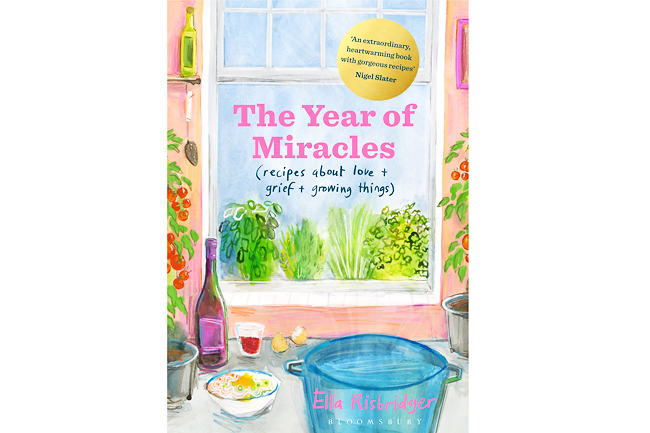Jennifer Reese
THE WASHINGTON POST – At the tender age of 25, while her contemporaries were Instagramming latte foam and downloading dating apps, the British author Ella Risbridger lost her longtime boyfriend to cancer. She had a contract to write a “cheerful dinner-party cookbook” but instead handed her forbearing editors The Year of Miracles, a luminous memoir about grieving, renewal and the twin consolations of friendship and cooking.
Sweetly illustrated with watercolours by Elisa Cunningham, The Year of Miracles makes a poignant sequel to Risbridger’s 2019 bestseller, Midnight Chicken. In Midnight Chicken, Risbridger wrote about how she cooked herself out of a suicidal depression. In The Year of Miracles, she cooks her way through bereavement. The two books are a gift to readers and cooks alike, although, for Risbridger’s sake, let’s hope that there are no additions to the bittersweet series anytime soon.
The year alluded to in the title is 2020 (a tough one for all) and the miracles are the manifold small pleasures that we decide to create, or simply acknowledge, in our everyday lives. These homely delights, Risbridger asserts, will sustain us through dark times. “I know now that it’s no use waiting for miracles,” she announced in her introduction. “You have to choose to find them from what you have, and where you are.”
Here’s where Risbridger is as the book begins: sitting glumly amid piles marked “to sell” and “to keep” in the soon-to-be-vacated “aftermath” of the home she had shared with her boyfriend. What she has: the carcass of a chicken. From the scraps of bird she conjures a pie and from the scraps of her shattered world she must now conjure a new one.

She does just that over the course of a year, describing her fitful progress month by month via tales of the dishes she cooked and the people for whom she cooked them. She moves in with a pal, perfects her focaccia, plants tomatoes, bakes a rhubarb custard cake and decides to paint her kitchen pink.
She also falls in love, although she refuses to privilege romance over friendship. The idea “that we’re supposed to save the flowers and the chocolates and the poems and the songs for the One” horrifies her. “What a waste!” she wrote. “What a shame!”
Risbridger’s recipes are discursive and poetic with suggestions for how we can savour even the cooking process itself more deeply. Her recipe for yuzu meringue bars is fussy, and she wants us to lean into the fuss. “It’s a commitment, and it is worth it,” she wrote, arguing that each moment you spend on these bars “is a perfect moment: still and calm and interesting.”
Again and again she asks us to slow down and relish what is at hand, to look closely and lovingly at the beauty and wholeness of the quotidian. A humble corner shop “smells like spices and doughnuts and someone else’s dinner and inside is – well, inside is the world,” she wrote.
“A world in a corner shop; eternity in an hour.” She doctors instant ramen with cheese and egg, a hack that prompts a lush poetic effusion: “the yolks spill through the broth, salty and rich, scarlet, golden, saffron and crocus and crimson and rose, all the colours of a fire, alive and always, every minute, new.”
Has anyone ever written such a lyrical tribute to Top Ramen? Is it perhaps a tad overripe? You can oversell the intoxicating wonders of the ordinary (or drab or difficult) and Risbridger sometimes does so. Likening grief to a shipwreck, she tells us: “You learn how to live in the ocean, and how it’s beautiful here, with the birds and the stars, and that phosphorescent algae stuff that glows like on Blue Planet II… You see the great white albatross and the great blue whale, like you never would have known if the ship had never sunk.”
If your experience of grief felt more like being hurled against a coral reef while hammerhead sharks circled, you are not alone. Likewise, the solace of small comforts can be exaggerated, as in an unreadable interlude about chicken soup. “When the feeling persists – the bad feeling – there is only one way out,” Risbridger wrote. “The way is chicken soup.” Her meandering three-page recipe for this magical elixir may test your tolerance for the twee.
But these excesses do not spoil the book, which is, for the most part, wise and tender, a reminder that however gloomy your situation, the world abounds in beauty, should you choose to see it. You might be filled with dread, but there are birthday cakes to frost, friends to drink with, fish pies to bake: “Think about buttery mashed potato, crisped under the grill until browned, the cheese on top bubbling; think about soft white fish, flaking off the fork; think about tender morsels of salmon and the tiny little treat of a prawn.” And now there is the treat, not that tiny or little, of Risbridger’s book.







